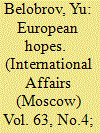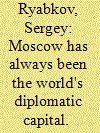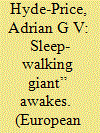| Srl | Item |
| 1 |
ID:
155340


|
|
|
|
|
| Summary/Abstract |
THE REGIME for conventional arms control in Europe, established in the 1990s after the end of the Cold War, was for those years a unique set of measures and was seen as a model suitable for other parts of the world as well. However, destructive activities by NATO member countries over the past two decades have eroded it and threaten to ruin it completely if these activities are not stopped. The Treaty on Conventional Armed Forces in Europe (CFE), which was considered the cornerstone of this regime, is practically dead.
|
|
|
|
|
|
|
|
|
|
|
|
|
|
|
|
| 2 |
ID:
146292


|
|
|
|
|
| Summary/Abstract |
Armen Oganesyan, Editor-in-Chief of International Affairs: Sergey Alekseyevich, recently, two foreign service chiefs - U.S. Secretary of State John Kerry and German Foreign Minister Frank-Walter Steinmeier - visited Moscow. I would like to ask you about the outcome of the talks with them. Some experts say: "A thaw has set in. " Others, including members of our expert club, are more skeptical. Maybe the truth lies somewhere in between?
|
|
|
|
|
|
|
|
|
|
|
|
|
|
|
|
| 3 |
ID:
141448


|
|
|
|
|
| Summary/Abstract |
A quarter of a century after the fall of the Berlin Wall, the role of the Bundesrepublik in Europe is once again the focus of international scrutiny and academic debate. Having long been seen as a “reflexive multilateralist” and “tamed power”, with a “leadership avoidance reflex” and a “civilian power” strategic culture, the Eurozone crisis has pushed the Berlin Republic into the role of “reluctant hegemon”. At the same time, however, Germany has been widely criticized by its EU and NATO partners for its half-hearted commitment to the Afghan war and its failure to support its allies in the Libyan intervention. Prompted by a call by Federal President Joachim Gauck in 2013 for Germany to live up to its international responsibilities, new themes in foreign and security policy have recently emerged. At the Munich Security Conference in February 2014, a more active and engaged approach was outlined by both the Foreign and Defence Ministers. This paper will examine recent shifts in the discourse of German foreign and security policy, and considers the extent to which these have been accompanied by significant shifts in policy outcome and implementation – particularly in the light of the Ukrainian crisis.
|
|
|
|
|
|
|
|
|
|
|
|
|
|
|
|